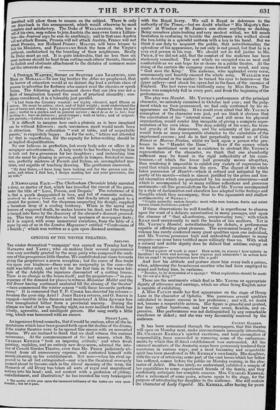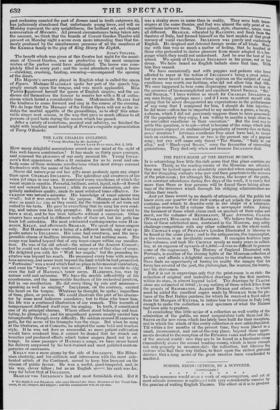OPENING OF THE WINTER THEATRES. ADELPHI.
THE winter dramatical " campaign" was opened on Tuesday last by MATHEWS and YATES; who on making their several appearances were very cordially greeted by the snug party who composed the audi- ence of this prosperous little theatre. We contributed our share towards giving the proprietors a warm reception; but the curse of free trade was upon our kindness—there was no reciprocity in the case—the night was bitter cold, and we felt for the first time in the warm lati- tude of the • Adelphi the injurious discomfort of a cutting breeze. There is no change in the house itself; and the proprietors—" in con- sequence of the demand for places to witness Monsieur Mallet and the Red Rover having continued unabated till the closing of the theatre" —have commenced the winter season "with those favourite perform- ances." It is rumoured that T. P. COOKE has deserted his colours— forsaken the poor ship Ariel ! Joan- REEVE returns, and 0. SMITH is engaged—terrible in his demons and monsters ! A Miss APJORN has been transplanted hither from a provincial nursery. During the glimpse we had of her on Tuesday night, we were inclined to think her a lively, agreeable, and intelligent person. She sang neatly a little song, which was honoured with an encore.
DRURY LANE.
An ingenious friend remarks, that itWould be curious, after all the la- mentations which have been poured forth upon the decline of the drama, if the winter theatres were to be opened this season with an unwonted impetus. We are inclined to think that we shall witness this curious occurrence. At the commencement of the last season, when 11/Ir. CHARLES KEMBLE " took an imposing attitude," and when fresh painting, regilding, and an entirely new drop-scene, adorned the inte- rior of Covent Garden Theatre, even then Mr. PRICE judiciously ab- stained from all unnecessary expense, and contented himself with merelys'cleaning up his establishment. But now—when his rival ap- peared to be all but extinguished—and when the theatrical monopoly seemed about to become such in the literal meaning of the term, the Monarch of old Drury has taken all sorts of regal and magnificent notions into his head; and, not content with a profusion of gilding, embellishment, and illustration,* he has invested his very boxkeepers * The merits of this pun upon the increased brilliancy of the lustre are very ques- tionable; but let it pass. with the Royal livery. We call it Royal in deference to the authority of the Times,—but we doubt whether " His Majesty's Ser- vants" at Windsor or St. James's can show anything so dashing. Behng ourselves plain-looking and very modest withal, we felt much hesitation in venturing to trouble the gentleman who walked about the box-lobby in a splendid uniform with a key in his hand. But we think it our duty to acquaint the public, that notwithstanding the splendour of his appearance, he not only is not proud, but that he is a very civil person in his way. We should not do full justice to Mr. PRICE, if we did not add, that the comfort of the audience has been studiously consulted. The seat which we occupied was as neat and comfortable as we can hope for or desire in a public theatre. At the rising of the curtain the company came forward as usual, and sang " God save the King." The audience, who applauded every verse, unanimously and heartily encored the whole song. WALLACK was quite devotional in the matter: he turned his eyes to heaven—or the upper gallery—and shook his opera-hat in the faces, of the enemies of England. The last verse was brilliantly sung by Miss BETTS. The house was completely full in every part, and from the beginning of the performance.
The play was Hamlet. Mr. YOUNG'S performance of the principal character, we minutely examined in October last year; and the judg- ment which we then pronounced, we find only confirmed by his re- appearance on Thursday. If we could even admit that Mr. YOUNG'S conception of the character was just, yet we think it obvious that the constitution of his "internal sense," and still more his physical organization, would render him incapable of giving a complete repre- sentation of his own ideas. The deep solidity of his voice, the hero- ical gravity of his demeanour, and the solemnity of his gestures, would form so many insuperable obstacles to the exhalation of the imprisoned essence ; and do in fact perpetually remind us of Cola Rienzi or Marcus Brutus, whilst we 'look upon a person who pro- fesses to be " Hamlet the Dane." Even if the causes which we have mentioned were not in existence to obstruct Mr. YOUNG'S representation of the character, we think that one abundantly sufficient may be found in the rigid inflexibility of his coun- tenance,—of which the lower half generally moves altogether, thus rendering it impossible to exhibit any variety of expression be- yond that which proceeds from the eyes. The disgust of life which takes possession of Hamlet—which is refined and mitigated by the purity of his morals—which is almost justified by the gross and hor- rid enormities which are perpetrated by his nearest connexions—and which is accompanied by so many sublime reflections and generous sentiments—all this proceeds from the lips of Mr. YOUNG accompanied by a style of declamation and elocution less adapted to the feelings and thoughts which they accompany, than to the squeamish and shallow sentimentality of SENECA !
?Cogita quamdiu eadem feceris: mori velle non tantum fortis aut miser verum etiam fastidiosus potest."
If these observations be well founded, it is superfluous to observe upon the want of a delicate accentuation in many passages, and upon the absence of " that all-softening, overpowering tone," with which KEAN used occasionally to melt the hearts of his auditors. Yet is Mr. YOUNG'S Hamlet, notwithstanding its defects, a performance capable of affording great pleasure. The economical bounty of Pro- vidence has rarely conferred many great qualities upon one individual, and Mr. YOUNG possesses high and undoubted excellence in many respects—as none have testified more willingly than we. With what a natural and noble dignity does he deliver that sublime. eulogy on human nature- " What a piece of work is man! How noble in reason I how infinite in faculties ! in form and moving how express and admirable ! in action how like an angel 1 in apprehension how like a god!
And how his attitude and gesture show him every inch a prince, when, addressing the treacherous courtier who had been employed to sound and betray him, he exclaims, " Besides, to be demanded of a sponge ! What replication should be made by the son of a King ?"
These are the sentiments which find in Mr. YOUNG an appropriate dignity of utterance and carriage, which no other living English actor is capable of exhibiting. A Miss FAUCIT made her first appearance on the stage of Drury Lane in the character of Ophelia. She possesses several qualities calculated to insure success in her profession ; and will, we doubt not, become a respectable actress. Her figure is graceful and genteel, her face rather handsome, and her voice sweet, flexible, and ex- pressive. Her performance was not distinguished by any remarkable excellence or defect; and she was very favourably received by the audience.
COVENT GARDEN.
It has been announced through the newspapers, that this theatre will open on Monday next, under circumstances unusually interesting. Mr. CHARLES KEMBLE'S spirited exertions, and bold assumption of responsibility, have succeeded in removing some of the embarrass- ments by which this ill-fated establishment was surrounded. All the eminent members of the dramatic corps have generously tendered their assistance in various ways; and a most becoming and respectable spirit has been manifested in Mr. KEMBLE'S own family. His daughter, with the view of retrieving some part of the vast losses which her father has suffered, comes before the public on Monday evening, in the cha- racter of Juliet. She has lately, we understand, exhibited a sample of her capabilities to some experienced friends of the family, and they confidently anticipate her complete success. Mrs. CHARLES KEMBLE, after a retirement of some years, returns again to the stage, for the purpose of introducing her daughter to the audience. She will sustain the character of Lady Capulet. Mr. KEMBLE, after having for years past reckoning enacted the part of Romeo (and in truth outgrown it), has judiciously abandoned that unfortunate young lover, and will on Monday represent the airy sprightliness, the brilliant wit, and elegant conversation of Mercutio. All present circumstances being taken into the account, we think that the boards of Covent Garden Theatre will present on Monday night a scene even more interesting than that for- merly produced by the simultaneous presence of all the members of the KEMBLE family in the play of King Henry the Eighth,
KING'S THEATRE.
The benefit which was given at this theatre last night for the assist- ance of Covent Garden, was as productive as the most sanguine Wishes of the parties could have anticipated. The house was com- pletely filled in every part ; and the usual attendants of such a house a--shrieking, crushing, fainting, swearing—accompanied the opening of the doors. -
His Majesty's servants played in English what is called the opera of Figaro. Madame MALIBRAN spoke her part of the speech trip- pingly enough upon the tongue, and was much applauded. Miss PATON 'approved herself the queen of English singers; and the au- dience did themselves the honour to receive her with a fit of enthu- siasm which lasted a considerable time. Mademoiselle BLASIS had the kindness to come forWard and sing in the course of the evening. We do hope that the Manager of the Italian Opera will not so far in- dulge the morbid appetite of the groundlings, as to slug this admi- rable singer next season, in the way that gave so much offence to all persons of good taste during the season which has passed. After a variety of evolutions, musical and saltatory, we finished the night with laughing most heartily at POWER'S exquisite representation of Terry O'Rourke.



















 Previous page
Previous page